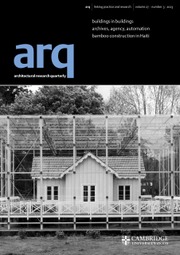Article contents
Fleabite: Gordon Matta-Clark and programmatic experimentation
Published online by Cambridge University Press: 27 November 2012
Extract
Gordon Matta-Clark (1943–1978), one of the lesser known architects of the second half of the twentieth century, studied architecture at Cornell University between 1962 and 1968. Although he had always been part of an active circle of artists and architects with whom he shared his radical ideas, Matta-Clark was generally excluded from the architectural milieu since his proposed interventions were thought to be unsuitable for accommodation. His exclusion from the architectural scene was marked; following his Window-Blow-Out(s) project in 1976, as Mary Jane Jacob has pointed out, his colleagues – including Peter Eisenman and the members of the Institute for Architecture and Urban Studies (IAUS) – found it very hard to accept an architect with a BB gun in hand. The removal of the facade in the 1974 Bingo project; the elimination of the thresholds in the 1973 Bronx Floors; or the cut to a suburban house in the 1974 Splitting project were all evaluated as temporary, and destructive in the making; and were thus regarded as artistic actions to transform buildings into objects. As such, his critical architectural productions remained overshadowed behind a series of seemingly violent artistic intrusions.
Information
- Type
- theory
- Information
- Copyright
- Copyright © Cambridge University Press 2012
- 1
- Cited by

